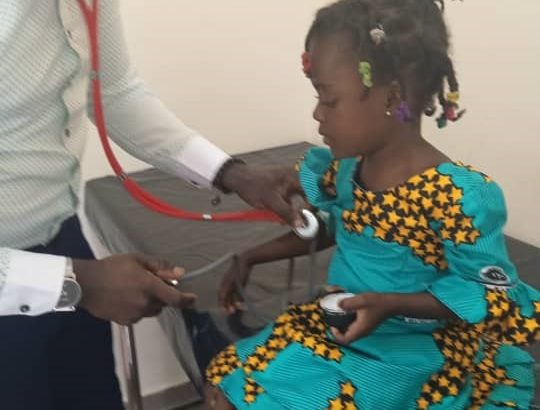August 23, 2021 marks a monumental and great day for Africa! Amidst the COVID-19 pandemic, Ghana undertook the herculean task of launching TyVEGHA, the first cluster-randomized, controlled Phase IV study of Typbar TCV® typhoid conjugate vaccine (TCV) in Africa. This study is an enormous step toward protecting Ghanaian children against typhoid.
The Typhoid Vaccine Acceleration Consortium (TyVAC) conducted a similar study in Dhaka, Bangladesh. From this study, plus others in India, Malawi, and Nepal, we know Typbar TCV is safe and efficacious in preventing typhoid. However, populations and exposure to typhoid differ across geographies. TyVEGHA will generate important population-level data on TCV in Africa. It will add further detail to what we already know about Typbar TCV and inform future typhoid prevention and control policies.
The goals of the study are to assess total vaccine protection – including population-level – and long-term effectiveness from a single dose of TCV in children aged 9 months to younger than 16 years in Asante Akim, Ghana. TyVEGHA will enroll a target 23,000 children in 40 clusters. A subset of 600 children will participate in an immunogenicity sub-study.
The World Health Organization recommends TCV in typhoid-endemic settings or areas with a high burden of antimicrobial-resistant Salmonella Typhi. The typhoid burden in Ghana is high, particularly in children under 15 years of age. Thanks to years of work from the Typhoid Fever Surveillance in Africa Program (TSAP) and Severe Typhoid Surveillance in Africa Program (SETA), we know a lot about the local communities. And with little migration, it is easier to follow the vaccinated children.
The TyVEGHA team has amassed ongoing surveillance data in Agogo, a village 80 km NE of Kumasi, since 2008. These data are critical to the study because they provide typhoid incidence estimates prior to vaccination. In addition, historical data show the incidence in rural Ghana is almost twice as high as in urban areas. These multiyear data highlight variability in typhoid incidence across Ghana. Decision-makers must consider this variability when determining the most effective typhoid control strategy.
The mass vaccination campaign that launched this week will continue for three months. It will include mop-up exercises within a catchment area population of about 100,000 people. These exercises will be followed by annual catch-up vaccination for eligible children at the study sites. Enhanced surveillance (SETA Plus) will be conducted in the study catchment area to detect clinical and blood culture-confirmed cases of typhoid. We will follow the participants for three years to assess the protective impact of TCV. Impact will be assessed for both vaccinated individuals and the overall population, which includes those that are not vaccinated.
TyVEGHA is part of the Typhoid Conjugate Vaccine Introduction in Africa program (THECA). THECA also includes a mass vaccination campaign and effectiveness component in the Democratic Republic of Congo as well as support from Gavi, the Vaccine Alliance for TCV introduction in Madagascar and Burkina Faso.



